Pet companionship provides seniors with numerous benefits. Emotionally, pets reduce feelings of loneliness and increase our mood by releasing endorphins, which act as natural painkillers. Physically, having a pet encourages an active lifestyle, lowering blood pressure and improving cardiovascular health. Socially, pets help us engage more with our community, combating isolation and fostering connections with others. From a cognitive standpoint, interacting with pets keeps our minds sharp, slowing down cognitive decline. Pets also promote routine and provide a sense of purpose, which are essential for our well-being. The joy and sense of responsibility that come with caring for a pet can greatly enhance our quality of life.
Emotional Support
Many seniors find comfort in the companionship of pets, which can greatly reduce feelings of loneliness and isolation. As people age, they're more likely to experience emotional challenges, making the constant presence of a pet especially valuable. Pets provide unconditional love, fostering a sense of security and belonging that can be a lifeline for seniors who might otherwise feel entirely alone.
Interacting with pets stimulates the release of endorphins, which act as natural mood boosters. This chemical response can significantly improve emotional well-being, giving seniors a sense of joy and purpose. Caring for a pet can also give seniors a renewed sense of responsibility, which is crucial for maintaining good mental health. The daily routines of feeding, grooming, and caring for a pet create a structured environment that can be comforting and fulfilling.
Dogs, cats, birds, and even hamsters can make wonderful companions for older adults. These animals offer more than just companionship; they provide emotional support that can greatly improve seniors' emotional well-being. By addressing loneliness through the unconditional love and presence of a pet, we can significantly enhance the quality of life for seniors.
Physical Health Benefits
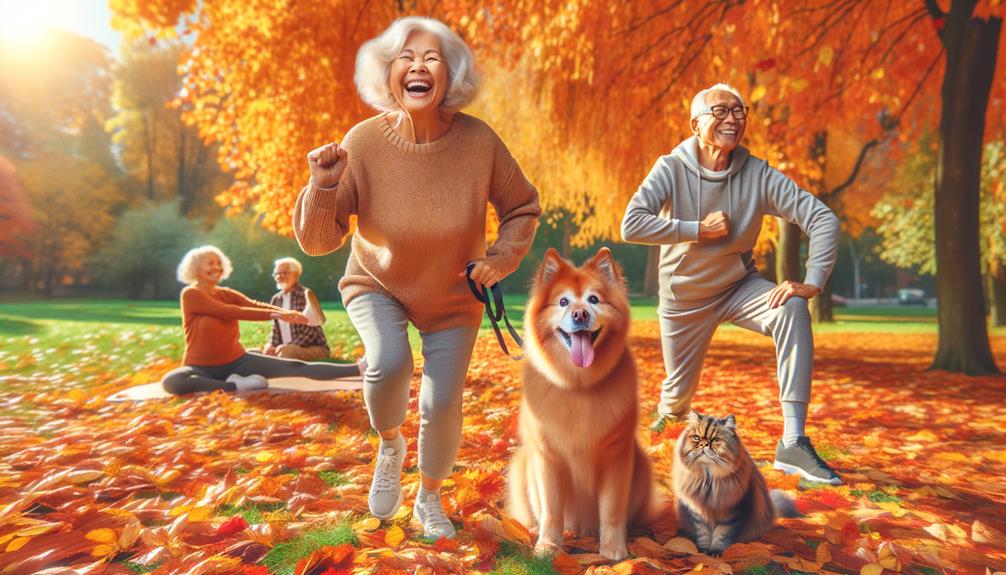
In addition to providing emotional support, pets also offer significant physical health benefits for seniors. Research has shown that owning a pet can enhance various aspects of physical well-being, particularly for older adults. For example, caring for a pet encourages an active lifestyle, which is essential for maintaining cardiovascular health. Activities like walking a dog or engaging in interactive play with a cat provide opportunities for physical activity and mental stimulation.
Interacting with pets has been shown to reduce stress, anxiety, and depression. This interaction leads to physiological changes that benefit overall health. Petting a dog or cat, for instance, releases endorphins, which act as natural mood boosters. This can help lower blood pressure and reduce the risk of heart disease.
Some physical health benefits of pet ownership for seniors include:
- Lower Blood Pressure: Regular interaction with pets can help keep blood pressure levels in check.
- Improved Cardiovascular Health: An active lifestyle fostered by pet care supports heart health.
- Natural Mood Boosters: The release of endorphins from petting animals can greatly enhance mood and reduce stress.
Enhanced Social Interaction

Pet companionship plays a significant role in enhancing social interactions and community engagement among seniors. With pets by their side, seniors are more likely to engage with neighbors and fellow pet owners during walks or at local pet-related activities. This increased social interaction helps build a sense of belonging and community cohesion, reducing feelings of loneliness and isolation.
In senior housing communities, pets serve as social connectors, creating opportunities for residents to interact. Whether it's a scheduled pet therapy program or an impromptu gathering in a common area, these interactions foster a supportive environment. Pet therapy programs, in particular, have been shown to expand seniors' social circles, enabling them to engage with others in meaningful ways.
Moreover, the companionship provided by pets offers seniors emotional support, encouraging them to be more socially active. As seniors share their experiences and bond over their pets, they build lasting relationships that enhance their overall well-being.
Stress Reduction
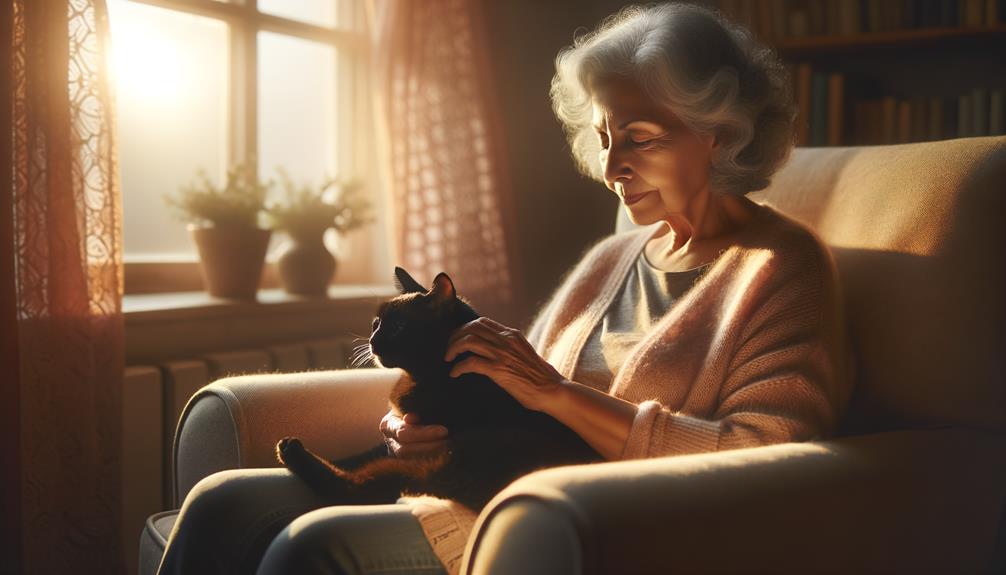
While having a pet can be a wonderful social experience for seniors, research also highlights the significant role pets play in reducing stress among seniors. Over three-quarters of pet owners report that their animals help them feel calm and relaxed. This stress reduction is crucial for seniors who often face various life stressors.
Interacting with pets, such as petting or playing, triggers the release of endorphins, which act as natural mood elevators. These interactions not only provide emotional support but also improve mental well-being. Pets offer a stable source of companionship, helping seniors cope with stress and anxiety. The presence of a pet can create a comforting routine that gives seniors a sense of purpose and emotional stability.
Research has identified several key ways in which pets contribute to stress reduction among seniors:
- Lower Blood Pressure and Heart Rate: Interacting with pets can physically lower stress levels, leading to improved overall health.
- Emotional Support: Pets offer a non-judgmental and consistent form of companionship, helping seniors manage emotional stress.
- Mood Boosters: The release of endorphins during pet interactions can elevate mood and promote mental well-being.
These benefits collectively underscore the significant role pets play in enhancing the quality of life for seniors through stress reduction and emotional support.
Improved Cognitive Function
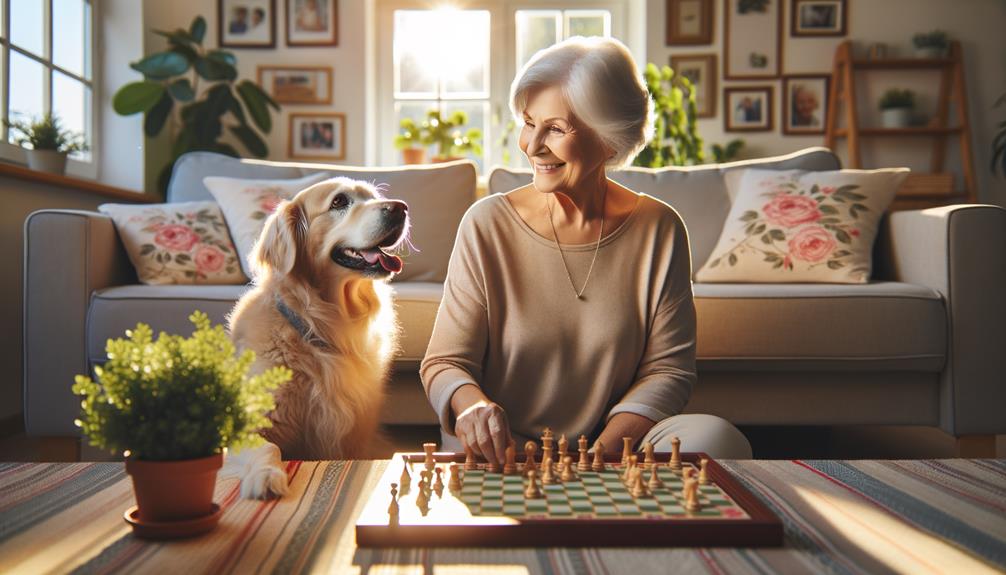
Interacting with pets can greatly enhance cognitive function in seniors by stimulating mental activity and reducing cognitive decline. Research has shown that the mental stimulation involved in pet ownership is crucial for maintaining cognitive function in older adults. Activities such as training, playing, and daily care provide seniors with opportunities to engage in problem-solving and improve memory.
The benefits of pet ownership extend beyond companionship; they create an environment where seniors are continually challenged mentally. This consistent engagement promotes mental agility and helps preserve overall cognitive health. Studies have found that the routine and responsibility associated with caring for a pet can notably enhance memory and problem-solving skills in seniors.
Moreover, engaging with pets can boost mood, which further supports cognitive functions. When we interact with our pets, the positive emotional response helps to enhance cognitive abilities, providing a holistic benefit to seniors' overall cognitive health. These interactions offer a sense of purpose and encourage continuous mental engagement, which is essential for mitigating cognitive decline.
Increased Physical Activity
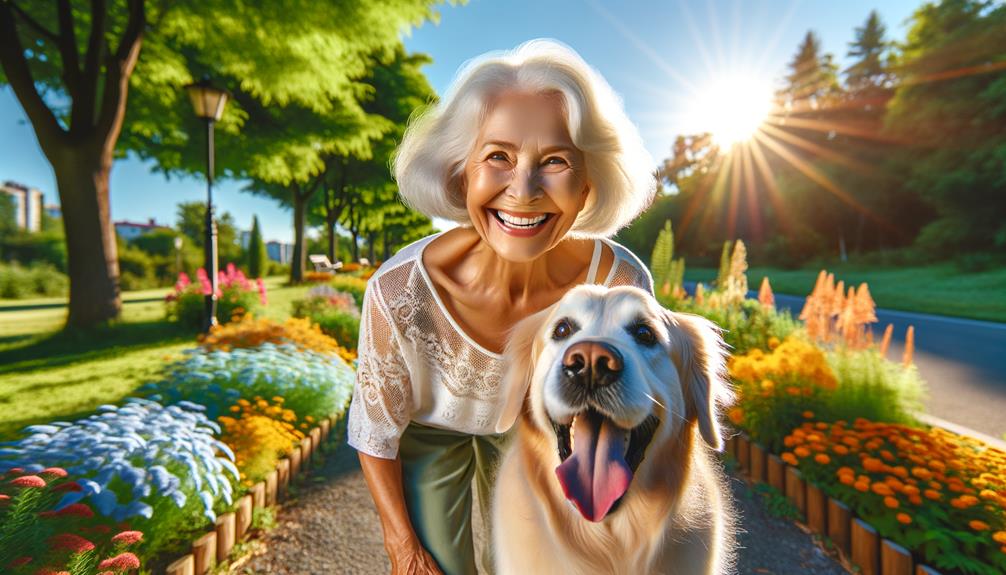
Owning a pet can significantly boost physical activity levels in seniors, leading to improved cardiovascular health and overall well-being. Research consistently shows that seniors who own pets, particularly dogs, are more likely to engage in regular physical activity, such as daily walks. This increased movement not only encourages seniors to stay active but also provides numerous health benefits.
For example, engaging in daily physical activity with a pet can improve cardiovascular health by maintaining heart health and reducing the risk of cardiovascular issues. It can also help maintain mobility, decreasing the likelihood of falls and other mobility-related concerns. Additionally, a more active lifestyle can lower the risk of chronic conditions, such as diabetes and hypertension.
The companionship of pets provides continuous motivation for seniors to remain physically active. This regular physical activity plays a significant role in improving overall well-being by lowering blood pressure, reducing stress, and enhancing mental health. Essentially, the presence of a pet offers seniors invaluable opportunities for exercise and outdoor activities, fostering a healthier, more active lifestyle.
Boosted Happiness
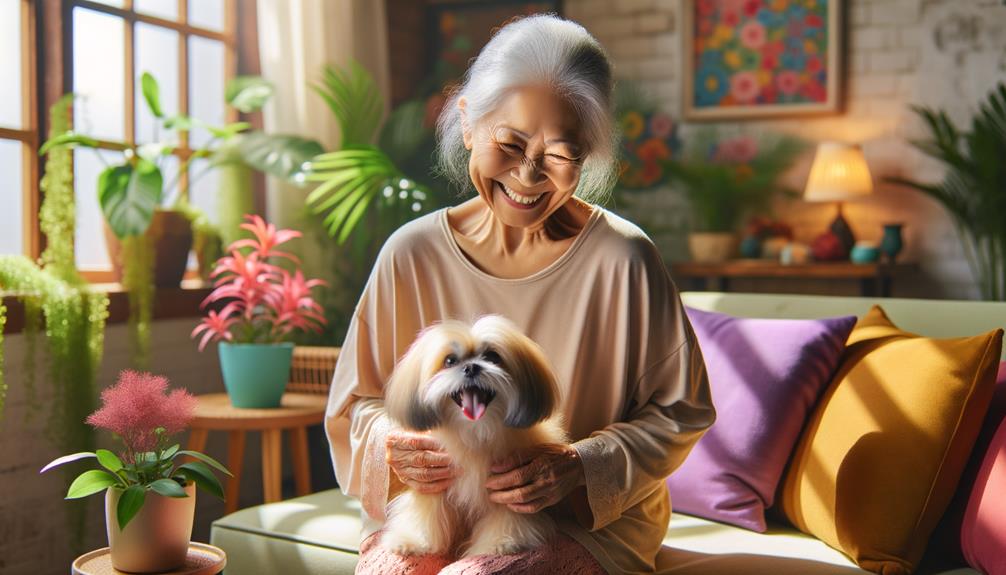
Research has consistently shown that seniors who own pets experience a boost in happiness and overall well-being. Interacting with pets triggers the release of oxytocin, a hormone that promotes feelings of joy and reduces feelings of loneliness. This companionship often leads to a significant improvement in life satisfaction, giving seniors a greater sense of purpose.
Reduced Loneliness
Seniors with pets often experience a significant reduction in loneliness and an increase in overall happiness, as supported by numerous studies. When considering senior care, it's clear that pet companionship offers substantial emotional support, mitigating feelings of isolation. Having a pet not only enhances seniors' well-being but also acts as a reliable source of happiness.
The presence of pets provides several benefits:
- Emotional Support: Pets offer unconditional love and closeness, vital for seniors experiencing loneliness. This companionship can greatly improve their emotional health.
- Combating Isolation: Regular interaction with pets helps seniors feel less isolated. The physical presence and responsiveness of a pet foster a sense of connection that alleviates feelings of isolation.
- Enhanced Well-being: The routine and responsibility of pet care promote a structured day, leading to increased happiness and overall well-being.
Studies confirm that seniors with pets report feeling happier and more fulfilled. This emotional connection with their pets combats loneliness and fosters a sense of purpose. By incorporating pets into senior care, we can significantly enhance their quality of life, ensuring they remain connected and content.
The benefits of pet companionship are undeniable. By recognizing the value of pets in senior care, we can create a more supportive and nurturing environment for our elderly population.
Increased Daily Joy
Having a pet can bring immense joy to seniors' daily lives. Interacting with their pets triggers the release of feel-good hormones like oxytocin and dopamine, which boosts their happiness levels and overall well-being.
Caring for a pet provides seniors with a sense of purpose and structure, giving them something to look forward to every day. The unconditional love and companionship from their pets can greatly elevate their happiness levels. Many seniors report that their pets bring laughter and moments of joy, helping them cope with daily challenges.
| Benefit | Description | Impact on Seniors |
|---|---|---|
| Emotional Support | Pets offer unconditional love and companionship | Boosts emotional well-being |
| Hormonal Boost | Interacting with pets releases oxytocin and dopamine | Enhances daily joy and happiness |
| Sense of Purpose | Caring for a pet provides structure and meaning | Contributes to overall happiness and quality of life |
| Moments of Joy | Pets bring laughter and light-heartedness | Helps overcome daily challenges |
In essence, having a pet enriches seniors' emotional lives and fosters a more joyful and fulfilling daily experience.
Frequently Asked Questions
Are Pets Good Companions for Old People?
Pets make excellent companions for older adults. They provide emotional support, reduce feelings of loneliness, and give seniors a sense of purpose. Studies have shown that pets have a profound impact on the emotional well-being and social interaction of seniors.
How Does Companionship Help Elderly?
Companionship plays a vital role in alleviating the profound loneliness that many elderly individuals experience. It creates a sense of community and belonging, offering emotional support and encouraging social interaction, which ultimately improves their overall quality of life.
Does Regular Interaction With Pets Improve the Health of the Elderly?
Regular interaction with pets can significantly improve the health and well-being of elderly individuals. Studies have shown that pet owners experience reduced stress levels and lower blood pressure. Moreover, pets provide companionship, emotional support, and a sense of purpose, which can greatly enhance the overall quality of life for seniors.
What Are the Health Benefits of Pet Ownership for Older Adults?
The health benefits of pet ownership for older adults are undeniable. Having a pet can lower blood pressure and cholesterol levels, alleviate feelings of loneliness and anxiety, and encourage physical activity and social interaction, ultimately leading to improved mental and physical well-being.



